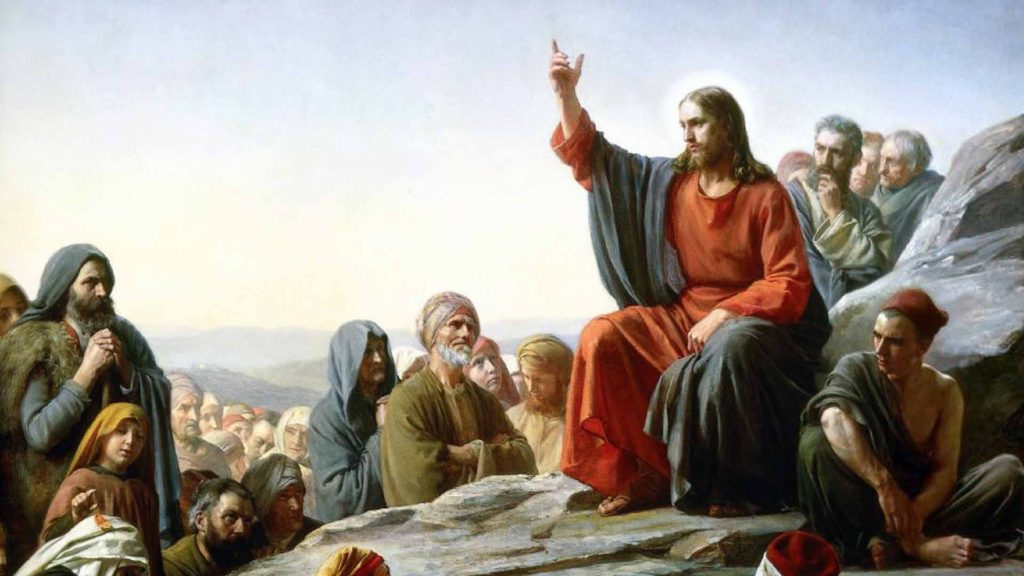Previously, we have spoken about the relationship between Jeshu and Christ/Maitreya. This was all about the mechanism that the World Teacher used to come amongst Humanity in 76 BCE and preach his message for the coming zodiacal age. The principal objective of his mission has already been recounted. Let us now look at the Piscean message in more detail.
Cyclically, we receive the same message. Every world teacher proclaims it and this task fell to Maitreya on this occasion. He was bringing us the one true religion. Needless to say, we would lose it again as we always did. We are told Christ forgives us of our sins. Yes, he did that. He could because there is no such thing as sin. It is a fiction that was instilled in Humanity dating back to the Black Priesthood in Atlantis.
Christ has no power to forgive because no monad has the ability to abolish any law of Nature or Life. So why did he forgive our sins? Because he was able to dispel the terrible illusion of a “crime against an infinite being, who demands infinite punishment in an eternal hell”. Therefore, sin is not a crime against God. What we term as “sin” is a mistake we make against the Laws of Nature and the Laws of Life. These mistakes are corrected through the good offices of the Lords of Karma. We all have to reap what we sow. This is the law of Cause and Effect.
What Christ/Maitreya was attempting to do was to save us from the terrible fall into what we saw as “sin”. This fall had not occurred because Adam happened to tuck into a fruit salad. The lie that was promulgated was that a crime had been committed against God. The concept of the “Fall” was invented to foist on us the false narrative of prohibitions and taboos. These taboos were impossible for most people to apply in their daily lives. The prohibitions were unreasonable in themselves and were positively hostile to life. They threatened eternal torture for anyone who erred against them. How satanic is that? As Laurency said, “the fall was to transform the godhead of the one life, into a brutal monster”. The concept of the “fall” was to redirect life, which is divine and could be filled with bliss, into a living hell. It separated us from our inalienable birthright, which is a co-partnership in unity with all monads. Worse still; could it get any worse? The concept of the fall deflected us away from appreciating that we incarnate to learn what reality is and live within the Laws of Life. This is how we evolve, as we are mandated to do under the Law of Development. Instead, we have ended up seeing ourselves as being dammed from the outset.
It is these mistruths that are brainwashed into our children and end up poisoning them throughout their entire lives. Is it any wonder so many people hate life and do not aspire toward unity? It is only very recently that people have realised that they can strive towards self-realisation. That they can engage in self-improvement. If you accept the narrative of the “Fall”, none of this would be feasible.
Maitreya’s teaching was carefully calibrated to appeal to as wide an audience as possible, within the constraints of people’s capacity to comprehend his message. He couched it by saying we are all citizens of the Kingdom of God. He reiterated that we could not sin against God. He pointed out that what we called “sin” was just our ignorance of the laws of Life and Nature. He also told us that we would have the opportunity, through the Laws of Karma, to set our wrongs to right. That message got lost somewhere in the post.
At the time and in the community in which the Bodhisattva was operating within, the Pharisees were the principal deceivers of their community. Against their lies and falsehoods, Christ preached that we were in essence all divine. He told those who would listen, that the “Kingdom of Unity” was within everyone. He pitched this message by saying that God was the “father to all” and we were his “Children”. God would never condemn or reject anyone. Christ told the gathering that we were all gods in temporary exile and would just have to reach out to reclaim our divine heritage. To understand that message you have to know about the Ante-verse, as this is our true home, even if we started as totally unconscious monads. If you follow the logic, that we are all children of God, then we are all brothers and sisters. This equates to one universal brotherhood. If we wish to inherit this pre-ordained unity, we need to first put it into living practice.
Christ was preaching to the Jews in Palestine. Their paradigm was based on the Laws of Moses. So, he taught that anyone who obeyed these tenants fulfilled the law. Basically, he was saying that you would be judged within the codes of your own law. Christ also directed people’s attention to the fact that Nature followed an innate law, one that chimed with the Law of Development. Another teaching you may recognise tells us to “be like children”. He was pointing out that children had an innate spontaneity and guiding compass and we would all do well to acquire some of this simplicity in our lives.
It should be noted that Christ/Maitreya did not preach one message to all his followers. As already said, the message was adapted to the audience’s capacity to understand. Most people have heard of the “Sermon on the Mount”. This address was only made to his chosen disciples. What he said would be beyond the capacity of non-disciples to understand. If you consider that most people in that era were living in fear and hate, if esoteric information was given to them, it would appear to be unattainable. This would bring ridicule to the message, destroying the authority of the Piscean teachings. If you feel that what is being taught is unreachable, then you gaze at what is revealed as though they are stars in the firmament. This serves no purpose. The fathers of the Church came along and reinterpreted these wise axions and said you should aim for the stars to reach the edge of the wood. This interpretation renders these ideals ineffective. What ended up happening is that these ideas lost their power and the laity ended up proclaiming that they followed these ideals, while they just participated in the cult of appearances. For example, if you go to church every Sunday, you must be a good Christian.
The highest truths were reserved for those who would understand them and be prepared to action the ideals they proclaimed. What is the point of telling someone about the Law of Sacrifice, when they could not grasp what it meant and had no intention of living a life of service? There is no point in forcing someone to do something. The will to change must come, spontaneously, from within.
To the masses, Christ spoke in parables. Many are relayed in the Gospels verbatim. Others were reformulated into miracle stories, such as the draught of fishes, the feeding of the 5,000 and the marriage of Cana. Just to expand here, the “kingdom of heaven” is attained by a fisherman once he realises that he must use the net of “unity”, then he will land his catch. The kingdom of heaven can also be equated to someone who brings his own provisions that he shares with 5,000 others. In the case of the Cana story, the host serves his guests the “waters of life” which are superior to any other beverage on offer. Another benefit to teaching in parables was that Christ could reach a large audience, sharing his wisdom with them all.
If you look at the waves of joy that circulate around a charismatic congregation, you can quickly see that no one is analysing and discussing Christ’s teaching. A much greater effect is occurring through an emotional impulse that circulates among the audience. This was also the case during the World Teacher’s ministry. Christ’s audience was able to imbibe if only temporarily, concepts which lead to greater attraction than would have been possible through an intellectual presentation.
What impacted the laity, impacted the disciples even more. This energy transfigured them into effective tools of service to Humanity. They witnessed the “glory of God”. Encompassed by Christ/Maitreya’s massive aura, the disciples became what they were seeing. They were beginning to experience god immanent. Outsiders may have viewed the disciple’s future path as one strewn with thorns, but for them, they knew where they were heading and knew the prize that awaited them.
The objective of the disciples was not to go out and preach a message. Like those charismatic churches, their objective was to raise the emotional energy of the gathering and drive it towards unity, towards the 5th Kingdom of Nature, the Kingdom of God.
How did we get from here to what we know as Christianity? That will be the topic of the next presentation.


